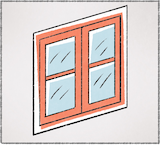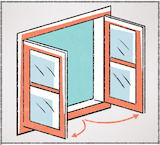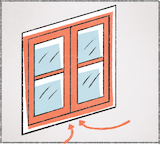


นี้คืออี่หยัง นี้คือหน้าต่าง
หน้าต่างอยู่ใส บ่ลู้คือกันว่าหน้าต่างมันอยู่ใส อาดสิอยู่ข้างบ้านของเขากะได้
หน้าต่างมีจักบาน หน้าต่างมีสองบาน
หน้าต่างสีอี่หยัง หน้าต่างสีแดง
หน้าต่างมีกะจกบ่ มีอยู่ หน้าต่างมีกะจก
กะจกหน้าต่างมีจักซ้อง กะจกหน้าต่างมีสี่ซ้อง
กะจกบานใหญ่บ่ กะจกบานบ่ใหญ่ กะจกบานพอดี
แล้วหน้าต่างบานใหญ่บ่ บานใหญ่อยู่ หน้าต่างบานใหญ่หลาย
17
หน้าต่างมันกำลังเป็นหญัง หน้าต่างมันกำลังเปิดอยู่
คือลู้ว่าหน้าต่างมันกำลังเปิดอยู่ กะลู้ เพาะว่าหน้าต่างมันกำลังอ้าออก
หน้าต่างมันอ้าออกจักบาน หน้าต่างมันอ้าออกเทิงสองบาน
เป็นหญังหน้าต่างมันคือเปิด บ่ลู้คือกันว่าเป็นหญังหน้าต่างมันคือเปิด คนอาดสิเปิดหน้าต่างนี้กะได้
18
หน้าต่างมันกำลังเป็นหญัง หน้าต่างมันกำลังปิดอยู่
เป็นหญังหน้าต่างมันคือปิด บ่ลู้คือกันว่าเป็นหญังหน้าต่างมันคือปิด
พุใดปิดหน้าต่าง บ่ลู้คือกันว่าพุใดปิดหน้าต่าง อันนี้กะบ่เห็นคือกัน
ขั้นหน้าต่างมันปิดแล้ว หน้าต่างสิเปิดอีกได้บ่ ได้อยู่ ขั้นปิดหน้าต่างแล้ว เปิดหน้าต่างอีกกะได้
Link to overview page
Link to dictionary
| Isaan | Pronunciation | Tones | Thai | English/Notes |
|---|---|---|---|---|
| นี้ | ni: | HF | นี้ | 1. this 2. here |
| คือ | khʉ: | HR | คือ | 1. to be, to resemble, like, as 2. why {บักหล้าคือบ่เก็บโต่ะแน่ = [addressing a young boy] Why haven't you cleared the table?} |
| อี่หยัง | i:-yaŋ | H-M | อะไร | 1. what {นี้คืออี่หยัง = What is this?} {มื้อนี้เจ้าเฮ็ดอี่หยัง = What are you doing today?} {กินเข้างายกับอี่หยัง = What did you have for breakfast?} 2. something, anything, (in negations) nothing {บ่ต้องเฮ็ดอี่หยังอีกเลยนอกจากใส่ปุย = [we] don't need to do anything besides adding fertilizer} |
| หน้าต่าง | na:-ta:ŋ | LF-H | หน้าต่าง | window |
| อยู่ | yu: | H | อยู่ | 1. to be (located) at 2. yet, still 3. auxiliary indicating continuous or progressive action {ทอดปาอยู่ในกะทะ = (in the process of) frying a fish in the pan} {แม่กำลังเมี้ยนเฮียนอยู่ = mother is cleaning/tidying up the house} |
| ใส | sai | M | (ที่)ไหน | 1. where? {สิไปใส = Where are [you] going?} {มาแต่ใส = Where are [you] coming from?} {กะทะอยู่ใส = Where's the pan?} 2. somewhere, anywhere {ใสกะได้ = anywhere, wherever you like} |
| บ่ | bɔ: | H | ไม่ | 1. no, not 2. question particle, transforming a statement into a question Notes: spelling exception in line with common usage on social media |
| ลู้ | lu: | HF | รู้ | 1. to know 2. to understand Notes: equivalent to ฮู้ |
| คือกัน | khʉ:-gan | HR-M | เหมือนกัน | 1. also, likewise, similarly {ยินดีที่ได้ฮู้จักคือกันคับ = Nice to meet you too!} 2. in negative sentences: either {บ่ลู้คือกัน = I don't know either} {จักคือกัน = I don't know (either)} |
| ว่า | wa: | H | ว่า | 1. that, as {คำว่า X = the word X} 2. to say |
| มัน | man | HR | มัน | it (also used to refer to people) |
| อาด | a:t | LF | อาจ | 1. might, may, will 2. likely |
| สิ | si | M | จะ | future tense auxiliary {เขากำลังสิตื่น = he's about to wake up} {สิไปตะหลาด = [I'm] going to the market} |
| ข้าง | kha:ŋ | LF | ข้าง | 1. side {มีหูจับสองข้าง = there are handles on both sides} 2. next to {วางอยู่ข้างๆ ก่องใบใหญ่ = it's placed next to the large box} {เขายืนอยู่ข้างๆ อีกพุหนึ่ง = he's standing next to another person} 3. clf. for body parts which come in pairs (eyes, ears, legs etc.) {เขามีตาสองข้าง = she has two eyes} |
| บ้าน | ba:n | HF | บ้าน | 1. house, home 2. village (also used as a prefix before the name of a village) 3. home country, home region {บ้านเฮาเฮ็ดเข้าจั่งใด = How do we plant rice in Isaan/Thailand?} |
| ของ | khɔ:ŋ | M | ของ | of, belonging to |
| เขา | khao | M | เขา | personal pronoun: he, she |
| กะ | ga | M | ก็ | 1. then, consequently 2. also |
| ได้ | dai | HF | ได้ | 1. can 2. to get, to obtain 3. before verb: indicating past tense 4. บ่ได้ + verb: not |
| มี | mi: | HR | มี | 1. to have 2. there is |
| จัก | jak | M | จัก | 1. answer to a question: [I] don't know, don't know exactly, [I'm] not sure {พุซายคนนี้เขาเถ้าไป่ จัก จักเถ้าหลือบ่เถ้า เบิ่งบ่ค่อยออก = Is this man here already old? I don't know. I can't see clearly whether he's old or not.} {เขาเว้ากันอยู่ใส จักคือกัน = Where are they talking? I don't know either.} 2. exact(ly), what exactly {จักต้มอี่หยังกะบ่ฮู้ = I don't know what (exactly) he is cooking} {บ่ลู้คือกันจักปาอี่หยัง = I don't know either what kind of fish this is} 3. how much/many? {ต้นไม้มีจักต้น = How many trees are there?} {ตอนนี้จักโมงแล้ว = What time is it now?} {มือของเฮานี้สิมีจักนิ้ว = How many fingers do our hands have?} 4. a bit, a little bit {จักหน่อย/จักหน่อยหนึ่ง = a bit, a little bit} |
| บาน | ba:n | M | บาน | clf. for flat objects, e.g., door, window (panes) {หน้าต่างมีสองบาน = the window has two panes} |
| สอง | sɔ:ŋ | M | สอง | two |
| สี | si: | M | สี | 1. color 2. colored pencil, crayon |
| แดง | dɛ:ŋ | M | แดง | red |
| กะจก | ga-jok | M-M | กระจก | 1. glass, glass pane, glass panel 2. mirror |
| ซ้อง | sɔ:ŋ | HF | ช่อง | 1. opening, slot 2. train cabin 3. TV channel 4. clf. for window panes |
| สี่ | si: | H | สี่ | four |
| ใหญ่ | ɲai | H | ใหญ่ | large, big |
| พอดี | phɔ:-di: | HR-M | พอดี | 1. to fit well 2. appropriate, just enough, just right {กะจกบานบ่ใหญ่ กะจกบานพอดี = not a large window, just right} {พอดีมือของเฮา = just right for his hand} 3. just in time, at the right moment, just this moment {แล้วพุซายคนนี้กะญ่างมาพอดี = and the man has come just now} |
| แล้ว | lɛ:o | HF | แล้ว | 1. finished 2. already 3. and then, and next (especially แล้วกะ) 4. auxiliary for past tense |
| หลาย | la:i | M | เยอะ, มาก | many, much, very |
| กำลัง | gam-laŋ | M-HR | กำลัง | auxiliary indicating continuous or progressive action |
| เป็น | pen | M | เป็น | 1. to be, to exist 2. to be able to 3. to suffer, sth. happens to 4. เป็นหญัง[...]คือ in initial position: why? {เป็นหญังเขากะคือแปงฟัน = Why is he brushing his teeth?} {เป็นหญังเคี่ยงบินมันคือสิตก = Why is the airplane falling down?} |
| หญัง | ɲaŋ | M | อะไร, เป็นหญัง = ทำไม | 1. what {เขากำลังเฮ็ดหญัง = What is he doing?} {ธูปเอาไว้เฮ็ดหญัง = What are incense sticks for?} 2. something, anything, (nothing) 3. เป็นหญัง[...]คือ in initial position: why {เป็นหญังเขาคือใส่บักพิกลงไปในกวยเตียว = Why is he putting chili in [his] noodle soup?} {เป็นหญังหน้าต่างมันคือเปิด = Why is the window open?} {เป็นหญังมันคือมีควนไฟ = Why is there smoke?} |
| เปิด | pə:t | M | เปิด | 1. to open {เปิดหน้าต่าง = to open the window} {เปิดปะตู = to open the door} 2. to start, to switch on {เปิดไฟ = to switch on the light} {เปิดแอ = to switch on the A/C} |
| เพาะว่า | phɔ-wa: | H-H | เพราะว่า | because |
| อ้า | a: | HF | อ้า | mouth, door, window: to open, to stand open {อ้าปาก = to open the mouth, to have the mouth open} |
| ออก | ɔ:k | LF | ออก | 1. to go out, to leave 2. out |
| เทิง | thə:ŋ | HR | ทั้ง | 1. up to, all, all of, the whole of, altogether {เขาใส่กางเกงขาสั้นเทิงสองคน = both are wearing short trousers} {เขาเป็นพ่อของลูกเทิงสามคนนี้ = he's the father of these three [children] here} 2. เทิง ... เทิง ...: both ... and ..., ... as well as ... {เทิงมีใบพ้อม เทิงมีเหลียนพ้อม = there are notes as well as coins} Notes: pronunciation: also realized as ทัง |
| คน | khon | HR | คน | person, people |
| ปิด | pit | M | ปิด | 1. to close {ปิดปะตู = to close the door} {ปิดก่อกน้ำ = to close the tap} 2. to finish, to switch off {ปิดไฟ = to switch off the light} {ปิดวิทะยุ = to switch off the radio} |
| พุใด | phu-dai | H-M | ใคร | 1. who {มีพุใดโทมากะบ่ลู้ = I don't know who has called} {ห้องนอนของพุใด = whose bedroom (is this)? } 2. someone, somebody, anybody, in negative context: nobody {บ่มีพุใดอยู่กับเขาเลย = there's nobody with him} |
| อัน | an | M | อัน | 1. thing, object 2. general clf. for objects |
| เห็น | hen | M | เห็น | to see |
| ขั้น | khan | LF | เมื่อ | when, if |
| อีก | i:k | LF | อีก | 1. more, again 2. other, another |